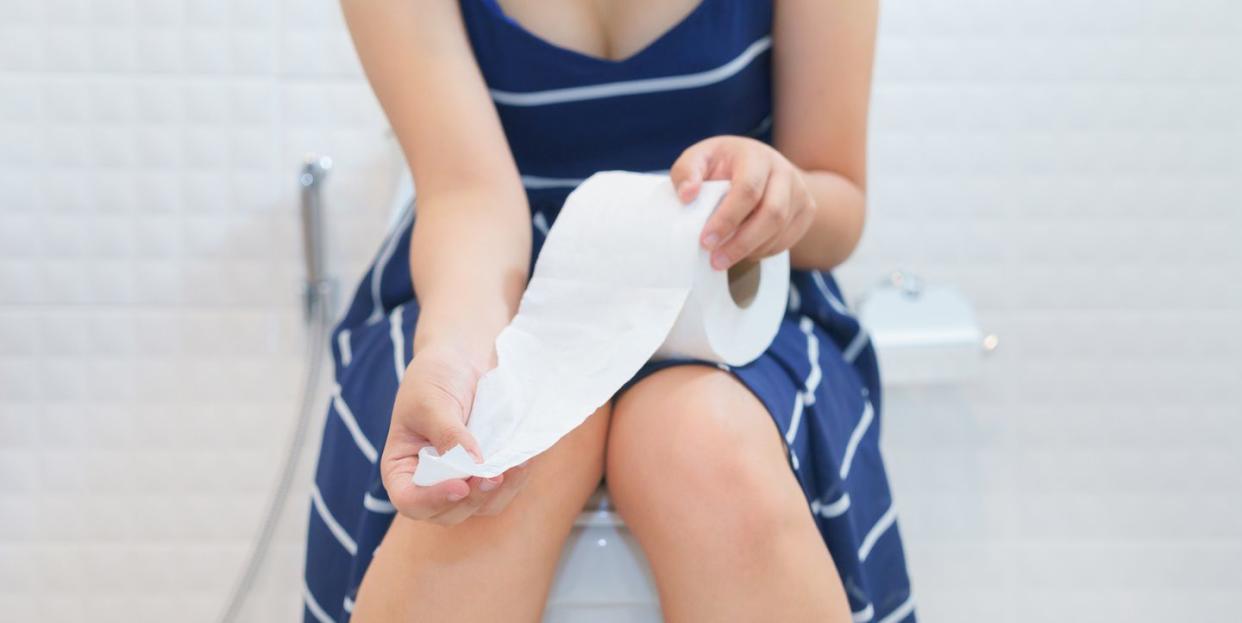This Is What It Really Means When Your Poop Is Green

This article was medically reviewed by Leila Kia, M.D., a member of the Prevention Medical Review Board, on June 14, 2019.
Let's skip the polite conversation (we're talking about poop, after all!) and get right to it. Here are the most common reasons why your poop looks like avocado toast took a whirl through the blender:
You're eating green things.
This is the most common cause of green poop. "Green stool is usually the result of a high quantity of leafy, green vegetables in one's diet,” says Niket Sonpal, MD, a New York City-based internist and gastroenterologist. “Aside from veggies, parents may notice their kid's poop turned green from the food coloring used in frosting-what I call Birthday Cake Syndrome."
You’re eating blue things.
Take a moment to think back to art class in elementary school where you learned about the color wheel. Blue + yellow = green. "By eating blue or purple berries, you can actually give yourself green stool, because blue tones mixed with yellow from the stomach's bile can result in bright green,” says Dr. Sonpal. “This it usually the most surprising to my patients and tends to be the most fun to teach in the exam room.” Meanwhile, if your stool is bright red and you haven’t recently eaten foods like beets, Jello, or cranberries, get prompt medical attention as the red hue may be an indication of blood.
You recently had your gallbladder removed.
In regular circumstances, bile is stored in your gallbladder. However, when that’s gone, your bile has nowhere to stay. "That means all the bile your body makes comes flying out constantly,” says Dr. Sonpal. “Be patient-it usually gets better on its own as your intestines get used to the increased volume of bile and adjust the absorption." During recovery, pay attention to your body, stay in contact with your physician, and let them know if the coloring continues for more than eight to ten weeks.
You have an infection.
An infection that affects your gut and triggers diarrhea can also cause green stool. "If you have an infection from bacteria like salmonella, E. coli, or clostridium difficile; viruses; or parasites like giardia, it can bring on diarrhea and increased bowel movements,” says Dr. Sonpal. “This fast-moving stool doesn't allow your naturally green bile to become brown." If you notice this happening, Dr. Sonpal recommends seeing your doctor right away to identify the root of the problem.
You’re taking antibiotics.
As if you didn’t have enough to worry about while you battle the aforementioned salmonella or C. difficile, antibiotic treatments can also turn your stool green. “This is because antibiotics sometimes kill good bacteria along with the bad ones,” says Dr. Sonpal. “Without the good ones, we get occasional green stools from changes in the microbiome of our guts.” While on antibiotics, Dr. Sonpal suggests boosting your gut flora with probiotics-either through supplements or eating fermented foods like kombucha or kimchi
You use Depo-Provera for birth control.
“The Depo-Provera shot works to suppress ovulation and has been associated with bloating or weight gain in some women, but I have had some patients notice green poop most commonly after their first few doses,” says Dr. Sonpal. “We still don’t know why this happens, but it's nothing to be concerned with and usually self-resolves. My person belief is it stimulates extra bile release, but we have no concrete proof yet." Other medications can trigger different colorations. For instance, Pepto Bismol can temporarily turn stools black, as can iron supplements. If you don’t think your green stool is the result of your diet, schedule a visit with your doctor to address your concerns.
Stay updated on the latest science-backed health, fitness, and nutrition news by signing up for the Prevention.com newsletter here. For added fun, follow us on Instagram.
('You Might Also Like',)

